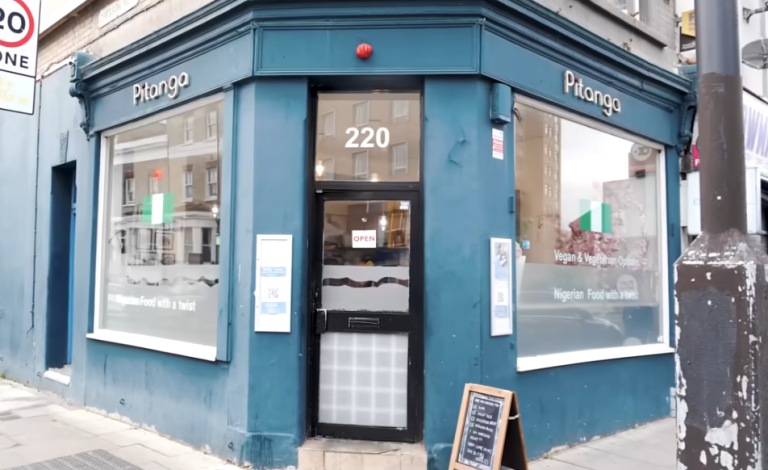In West Kensington, a small section of North End Road has subtly become a culinary hotspot. Anglo-Nigerian chef Nky Iweka founded Pitanga Restaurant, which does more than just serve food; it tells a story. Her goal, which started as a teenage dream, was to see Nigerian food in the UK treated with the same respect as other cherished ethnic customs. Pitanga, which opened its doors in May 2018, has emerged as a remarkably significant addition to London’s culinary scene, with each dish combining comfort and intrigue.
Nky redefines what it means to eat Nigerian food in a modern context by combining technique and memory. She skillfully reimagines traditions, striking a balance between modern flair and nostalgic warmth, rather than reproducing them exactly as remembered. Because of Pitanga’s dual heritage and her profound respect for seasonal ingredients, each plate tells a story.
Pitanga Restaurant – WordPress-Compatible Table
| Category | Details |
|---|---|
| Restaurant Name | Pitanga Restaurant |
| Founder & Head Chef | Nky Iweka |
| Cuisine Type | Anglo-Nigerian Fusion |
| Established | May 31, 2018 |
| Location | 220 North End Road, London W14 9NX, United Kingdom |
| Menu Highlights | Jollof Rice, Suya, Egusi, Chin Chin, African Vegan Platter |
| Unique Aspects | Vegan and gluten-free options, Sunday BBQ, local partnerships |
| Celebrity Connection | Allegedly favored by actor Idris Elba |
| Official Website | pitangalondon.com |
| Instagram Handle | @pitanga_london |
Anyone who knows West African home cooking knows that entering Pitanga is like opening a handwritten letter from home, with every word carefully chosen for impact, style, and rhythm. Pitanga bridges a cultural divide with remarkable nuance by crafting dishes like aromatic pepper stew, silky egusi soup, and smoky suya. It isn’t afraid of strong spices or hearty stews. Rather, it enhances them through sophisticated textures and careful arrangement.

The restaurant’s approach to tradition is especially creative. Nky sharpens the flavors, making each element stand out without overpowering the others, as opposed to diluting them to please unaccustomed palates. As a result, the menu is incredibly successful at drawing in new customers while holding on to the allegiance of Nigerian diners who understand the deeper meanings behind each bite.
Pitanga transforms into an event venue masquerading as a restaurant during weekend brunches and their increasingly well-liked Sunday barbecues. The background pulses softly with Afrobeat. People stay longer. Plantains, grilled meats, jollof, and sauces that strike a balance between sweetness and heat are among the dishes that arrive in rhythm. These events are more akin to cultural salons than restaurant service, with the food serving as the focal point and a topic of conversation.
Pitanga is especially memorable because of its capacity to foster connections. Every meal has a human presence, whether it be in the form of a plate of pounded yam or a flavorful fish pepper soup. In London’s fast-paced restaurant industry, Nky’s choice to remain near the floor to greet customers, show newcomers the menu, or occasionally share a personal story adds an emotional depth that is uncommon.
Notably, Pitanga cooks for more reasons than novelty. With unexpected sophistication, the menu adapts to changing dietary requirements. With dishes like vegan-friendly stews and gluten-free puffs, the kitchen serves a wide range of patrons while staying true to its Nigerian roots. Because of its gastronomic and cultural diversity, Pitanga has developed from a specialty restaurant to a popular destination.
Customer feedback reveals a nuanced blend of expectation and admiration. Occasionally, some diners, especially those with traditional tastes, make remarks about the delicate reworking of traditional dishes. According to others, it’s “soul food, updated for today.” A few reviews mention inconsistent service—a common challenge for small, independent kitchens—but even those critiques are tempered by praise for the flavors and the sense of community.
Pitanga’s clientele is just as diverse as its menu. Families celebrating birthdays, couples on quiet date nights, homesick students, curious foodies, and even a few A-list Londoners all gather under one roof. The rumor that Idris Elba favors Pitanga only adds to the restaurant’s appeal. Whether true or not, it speaks volumes about the reach and resonance of what Nky and her team have built.
By highlighting African cuisine in a way that feels both elevated and accessible, Pitanga has become a cultural ambassador as much as a dining destination. In recent months, the team has introduced new seasonal items like plantain curry and yam croquettes—each made with purposeful ingredients and plated with intention. These additions represent more than just menu variety; they reflect a philosophy of continuous refinement.
Pitanga also subtly challenges assumptions around African food. Too often, such cuisines are confined to “comfort food” narratives. Comfort, however, does not equate to compromise in Pitanga. The presentation is purposeful, the spices are unreserved, and the flavors are layered. Nky has demonstrated that African cuisine merits the same recognition, attention, and awards as any fine-dining cuisine by being consistent and meticulous.
The rise of Pitanga has a larger significance. For up-and-coming African chefs, particularly women, the restaurant represents opportunity. Its existence supports the notion that entrepreneurship and heritage can coexist harmoniously. For younger generations, it signals that the flavors they grew up with aren’t just relevant—they’re aspirational.
Looking ahead, Pitanga shows no signs of slowing down. While expansion plans remain unannounced, there’s little doubt the brand could thrive in multiple neighborhoods—or even overseas. Still, part of its magic lies in its grounded presence. It feels local, intentional, and intimately tied to its community. That’s something difficult to replicate.


